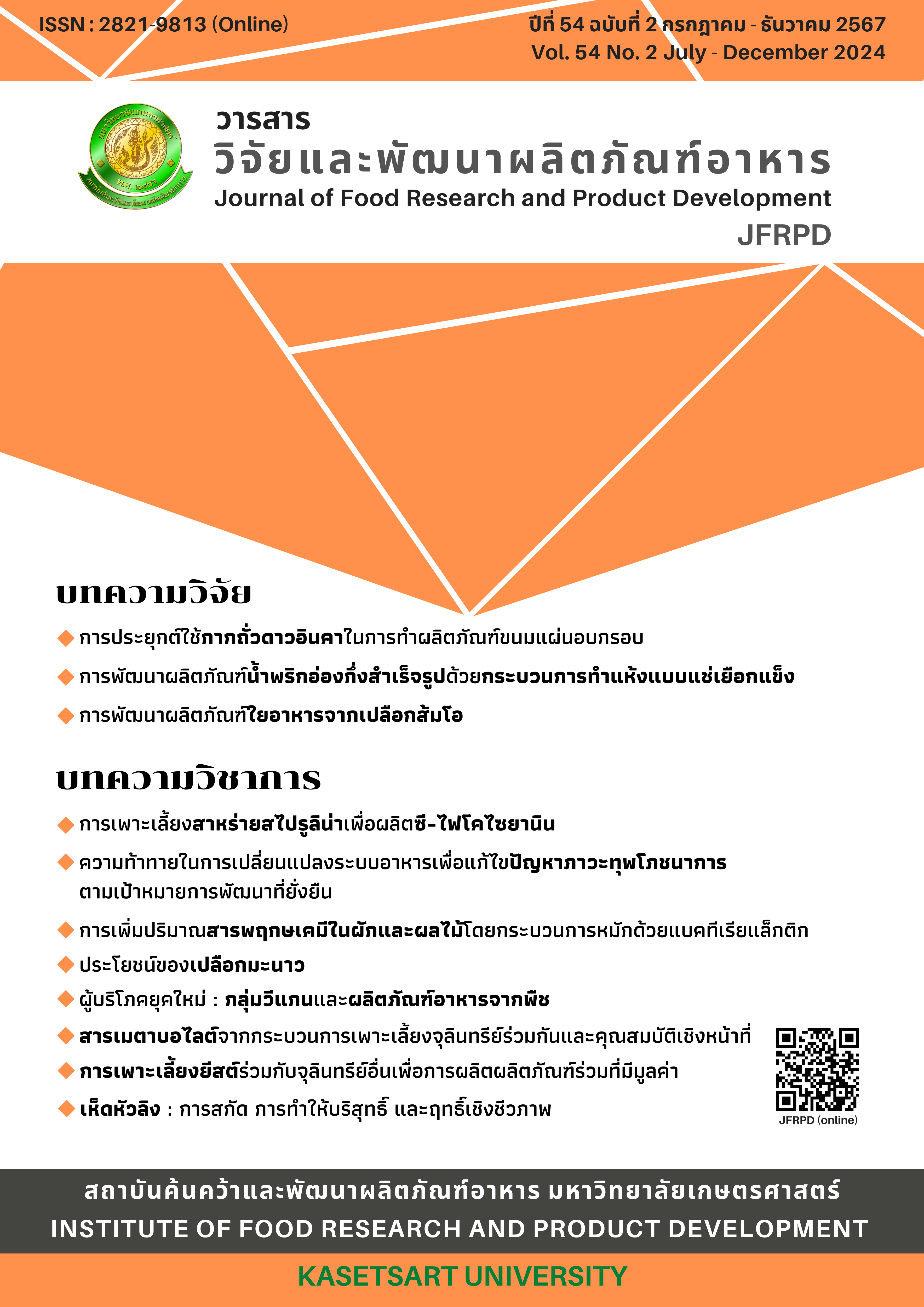Modern consumer : vegan and plant-based food product
Main Article Content
Abstract
Currently, there is a rising trend of consumer groups abstaining from meat and animal derived products. These groups of people mainly focus on consuming foods such as vegetables, fruits, and grains. They are divided into 3 primary groups: vegetarians, Buddhist consume vegetarians, and vegans. The vegan group is the most stringent in their dietary restrictions. Additionally, they refrain from consuming meat and products derived from animals. However, raising animals for food or industries related to meat products and other animal derived good also impacts the environment. This is due to the greenhouse gas emissions from the animal industry, which contribute to deforestation and pollution of water sources. The final reason is that vegans want aim to maintain good health and reduce the risk of health problems caused by meat or animal products consumption. However, it can lead to nutrient deficiencies that typically come from animals. These nutrients can be replaced with vegetables, fruits, and various grains. Therefore, it is essential to plan meal carefully to ensure adequate nutrients intake without relying on meat. The number of people abstaining from meat consumption is on the rise. This has led to the creation of food products derived from plants, commonly known as plant-based food, which are currently experiencing a surge in popularity, driving significant market. This highlights the importance of developing and researching plant-based food products because individuals who do not consume meat seek options within this category that are both more diverse and closely animal deriver products.
Downloads
Article Details

This work is licensed under a Creative Commons Attribution-NonCommercial-NoDerivatives 4.0 International License.
References
จีระศักดิ์ คำสุริย์ เมธาวี ชุณหวุฒิยานนท์ และ ดุจเดือน บุญสม. (2562). รายงานการวิจัยเรื่อง “โครงการศึกษาตลาดอาหารวีแกนเพื่อรองรับการพัฒนาอุตสาหกรรมอาหารของไทย”. อุตสาหกรรมพัฒนามูลนิธิเพื่อสถาบันอาหาร.
Gebhardt B, Hadwiger K. Plant-based foods for future. Results of consumer and professional expert interviews in five European countries - EIT-Food Project “The V-Place”. 2020.
Janssen M, Busch C, Rödiger M, Hamm U. Motives of consumers following a vegan diet and their attitudes towards animal agriculture. Appetite. 2016;105(1):643-51.
Rothgerber H. Underlying differences between conscientious omnivores and vegetarians in the evaluation of meat and animals. Appetite. 2015;87(1):251-8.
Ruby MB, Cheng TK, Heine SJ. [Cultural differences in food choices and attitudes towards animals]. Unpublished raw data. 2011.
Ploll U, Petritb H, Stern T. A social innovation perspective on dietary transitions: Diffusion of vegetarianism and veganism in Austria. Environ Innov Soci Transit. 2020;126:59-67.
Steinfeld H, Gerber P, Wassenaar T, Castel V, Rosales M, Rosales M, Haan C. de. Livestock's long shadow: Environmental issues and options, FAO publications. 2006
Fu Y, Chen T, Chen SHY, Liu B, Sun P, Sun H, Chen F. The potentials and challenges of using microalgae as an ingredient to produce meat analogues. Trends Food Sci Technol. 112: 188-200. Cited in Mottet, 2021;112:188-200.
Melina V, Craig W, Levin S. Position of the academy of nutrition and dietetics: vegetarian diets. J Acad Nutr Diet. 2016;116(12):1970-80.
Tuso PJ, Ismail MH, Ha BP, Bartolotto C. Nutritional update for physicians: plant-based diets. Perm J. 2013;17(2):61-6.
Fresan U, Mejia M, Jaceldo-Siegl K, Craig W, Sabate J. Looking for a nutritive and sustainable source of protein. Curr Dev Nutr. 2019;3:1083-93.
Suttera DO, Bender N. Nutrient status and growth in vegan children. Nutr Res. 2021;91:13-25.
Melina V, Craig W, Levin S. Position of the academy of nutrition and dietetics: vegetarian diets. J Acad Nutr Diet. 2016;116(12):1970-80.
Jeffrey Soble.Health benefits of a vegan diet.Rush Content Hub; 2019. [cited 2024 Apr 9]. Available from: https://www.rush.edu/news/health-benefits-vegan-diet
Grand view research. Vegan food market size, share & trends analysis report by product (Dairy alternative, meat substitute), By Distribution Channel (Online Offline), By Region (APAC, CSA, MEA, Europe, North America), And Segment Forecasts, 2019-2025; 2019 [cited 2024 Apr 3]. Available from: https://www.grandviewresearch.com/industry-analysis/vegan-food-market
Ploll U, Petritb H, Stern T. A social innovation perspective on dietary transitions: diffusion of vegetarianism and veganism in Austria. Environ Innov Soci Transit. 2020;36:164-76.
Santaoja M, Jallinoja P. Food out of its usual rut. Carnivalesque online veganism as political consumerism. Geoforum. 2021;126:59-67.
The Vegan Society. Statistics about veganism 2021; [cited 2024 Apr 3]. Available from: https://www.vegansociety.com/news/media/statistics/worldwide
สำนักงานส่งเสริมการค้าในต่างประเทศ ณ กรุงเฮก. รายงานผลิตภัณฑ์ทดแทนเนื้อสัตว์ ราชอาณาจักรเนเธอร์แลนด์ 2020; [เข้าถึงเมื่อ 1 เม.ย. 2567]. เข้าถึงได้จาก: https://www.ditp.go.th/contents_attach/597176/597176.pdf
พชรพจน์ นันทรามาศ อภินันทร์ สู่ประเสริฐ และพิมฉัตร เอกฉันท์. (2563). ทำความรู้จัก Plant-based Food เมื่อเนื้อสัตว์จากพืชกลายเป็นเทรนด์อาหารโลก. นิติย2020; [เข้าถึงเมื่อ 1 เม.ย. 2567]. เข้าถึงได้จาก: https://krungthai.com/Download/economyresourcee/EconomyResourcesDownload_452Plant_based_Food_10_11_63.pdf

